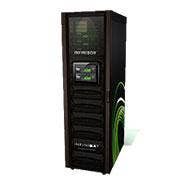Infinidat Adds Unified SAN-NAS Storage, High-Performance Async Replication For No Charge

Multi-petabyte enterprise storage startup Infinidat on Monday added two significant capabilities to its InfiniBox storage systems, and unveiled a new entry-system that brings the technology to smaller customers with no per-Gbyte cost premium.
Infinidat added NAS capability to the InfiniBox to let customers run both block and file storage on the same solution, and introduced a high-performance version of asynchronous replication. Both capabilities are no-cost software upgrades, said Brian Carmody, chief technology officer of the Needham, Mass.-based vendor.
The company also introduced the InfiniBox F2000, a new version of the InfiniBox that lets customers start at 250 TBs of usable capacity vs. the previous entry point of 1 TB, Carmody told CRN.
[Related: Infinidat Unveils $150M Funding, Intros Advanced Unified Storage Solution]
Infinidat was founded by CEO Moshe Yanai, who in the 1980s managed the development of what eventually became EMC's flagship Symmetrix line of storage arrays, now known as VMAX. After leaving EMC, Yanai founded XIV, which IBM acquired in 2008 and which now forms the backbone of IBM's enterprise XIV storage family, and Diligent Technologies, a deduplication software developer also acquired by IBM.
That pedigree convinced Xioss to sign up with Infinidat, said Mark Galyardt, executive vice president of the Atlanta-based solution provider.
"I worked with Diligent, IBM and Moshe," Galyardt told CRN. "Moshe has a strong track record."
Galyardt said the introduction of a lower entry point InfiniBox will be a boon for customers not ready for the higher capacities, but who will likely grow to need the larger systems. "And add on the new software, Infinidat has a great strategy," he said.
Carmody said that Infinidat has been in beta with the new NAS capability on its InfiniBox for some time as a way to expand beyond the Fibre Channel-based and iSCSI-based SAN solution now offered.
"The upgrade to the Infinidat File System allows access to file-based storage with 400,000 IOPS performance," he said. "Customers will be able to create consistency groups with both file and block access. They can treat file and block the same with one-button data protection, at no additional cost."
Carmody said the InfiniBox arrays in the field are already NAS-ready, and so downloading the software immediately gives them unified NAS and SAN functions.
The other software upgrade is what Infinidat calls near-sync replication. Near-sync replication is a form of asynchronous replication that helps data break the 20-kilometer to 50-kilometer limit for synchronous replication while providing a recovery point object, or RPO, of under four seconds, Carmody said.
"The shorter the RPO, the less data someone loses in a disaster," he said. "We guarantee that if there is a disaster at the primary site, the secondary site will be providing the data in no more than four seconds."
Carmody admitted to CRN that by "guarantee" he does not mean a formal guarantee. "The link between the two sites might not have enough bandwidth," he said. "You need sufficient bandwidth. But if customers fall behind their SLA [service level agreement], we will provide them with a notification."
Customers should know that not all asynchronous replication is the same. "Our near-sync replication uses snapshot technology," he said. "It lets us offer a fully loaded system with a four-second RPO vs. other solutions with no replication, all with no performance overhead."
Also new from Infinidat is the InfiniBox F2000, a midrange storage array that includes all the storage services of the larger InfiniBox F6000 at no charge, but starting at a smaller configuration.
Carmody said the F2000 lets customers start at two disk enclosures with 120 hard drives vs. eight enclosures with 480 hard drives for the F6000. That gives a starting configuration of 250 TBs of usable capacity. Customer can also order up to 48 GBs of flash storage for performance.
Carmody said Infinidat started at a higher configuration before offering a smaller configuration because it is easier to start big and then develop a smaller version than the opposite. "Scaling up is the hard problem, not scaling down," he said. "Also, while the typical petabyte-scale storage solutions go to such applications as genomics, we are seeing customers asking for the lower entry points."
While the F2000 currently will not scale up to become an F6000, that capability is coming, Carmody said. However, despite its smaller initial configuration size, the per-Gbyte of usable capacity price target of $1 per usable Gbyte is the same including the hardware, software and three years of 24x7x365 support.
Infinidat is also offering customers a variety of financing options, including a capacity-on-demand utility model, he said. "We're a small company," he said. "We want to be easy to do business with."
Carmody said Infinidat has about 70 channel partners worldwide, and more than 50 percent of sales came through the channel in the past quarter. "We set up our program so there is no financial penalty for sales reps to work with partners," he said.
PUBLISHED SEPT. 21, 2015